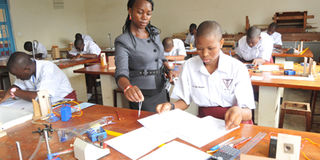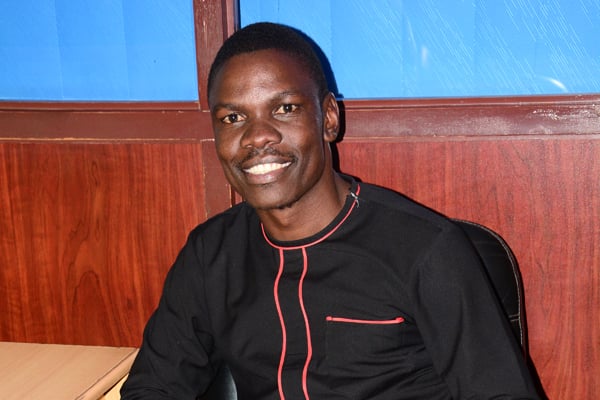Prime
Why UNEB did not set final exams this year

Trinity College Nabbingo UCE candidates sit exams. Below, Uneb spokesperson Jennifer Kalule. Photos / File
What you need to know:
- The move left many stakeholders with more questions than answers. Candidates feel disappointed while experts say it would not be a fair examination given a majority of students were unable to continue learning after schools were closed to prevent the spread of Covid-19.
It is already confirmed that Uganda National Examinations Board (UNEB) will only be ready to set examinations for assessment of the 2021 candidates next year in May when the Ministry of Education sets dates for the finalists.
According to Uneb officials, there was no way they would set examinations when students had been out of school for more than five months and were never directed by the ministry to make sure the candidates are assessed this year.
Jennifer Kalule, the senior spokesperson of Uneb says they will only be able to set examinations for students whom they are sure have been learning and been through a school setting for a stipulated amount of time.
“We were unable to set examinations because of the situation that has been in the country. Everyone was under lockdown and students were not studying, it would not be fair for us to set examinations under such circumstances,” Kalule says.
Experts question the decision
When the government imposed the second countrywide lockdown as a measure to curb the spread of the Covid-19 pandemic in June this year, one of the affected sectors was education. President Museveni initially ordered the closure of schools for six weeks but they have remained firmly shut.
It is hoped that they will reopen next year, when more than 22 million people will have been vaccinated. This, according to Unicef makes Uganda the country that has closed schools longest in the world trailed by Nepal (74 weeks), Bolivia (73 weeks).
At the closure of schools in June, the ministry of education gave out learning materials for students at different levels to continue with the learning process from their homes.
Emmanuel Wanyama, the executive director of Pure Heart Foundation in Kampala, an organisation that takes care of more than 850 students, says that when the learning materials were released by the Ministry of Education, he encouraged all the students to use them diligently.
“Some students have never stopped learning, they only got onto other avenues from which to learn. Some of them have been buying newspapers, others follow the lessons on TV while others downloaded learning materials from different apps as provided by the government,” Wanyama says.
The challenge with postponing examinations, according to experts is that it demoralises the students who have been learning for all this time.
Annet Wandera, an education specialist and education quality controller at Opportunity International, says:
“Students will not have the same enthusiasm for examinations as they had when they were learning after the lockdown. We are not even sure that the schools will be open next year as the president says because it is all speculative. What if another wave sweeps by?” Wandera wonders.
“We need to know that Covid-19 is here with us and it might not go away tomorrow, we need to adopt methods of assessing students with or without coronavirus. We can use what other curricular systems use such as the Cambridge Education system,” she adds.
Kenneth Mulungi, a Senior Six candidate at Trinity Senior Academy in Bwebajja, Wakiso District, says he has lost the morale because he has to wait for more than six months to be assessed on what he has been reading every day for the last one and a half years.

Fagil Mande, education expert and former Uneb chairman.
“When they closed schools, our school continued sending us work as well as attending zoom classes. We knew there was going to be an examination set for us at the end of the year but now we are disappointed. We cannot read as hard as we used to. Some students have gone to do other things and abandoned classes altogether,” Mulungi says
However, Fagil Mande, an education expert, and former Uneb chairman says the blame should not be placed on the national examinations body but calls for understanding from all stakeholders given the situation.
“We cannot go on blaming Uneb. Even if there have been virtual lessons and zoom classes being conducted that is not the best way of learning. We need to change the kind of questions set by Uneb to be issues-centered and more practical than they are at the moment. The problem has been caused by the pandemic and we need to know that it has affected everyone in the society,” says Mande.
What this means
Mande says that most likely if Uneb has set examinations this year, they would have realised the lowest student turn up countrywide. The low turn up of students for exams was noticeable in August at the release of last year’s results which indicated that 2,804 of the 333,396 candidates who registered to sit for the Uganda Certificate of Education (UCE) exams last year did not show up.
Figures also indicate that this number had dramatically dropped by 4,324 from 337,720 in 2019. The ministry of education attributed the drop to the academic year which was disrupted by the pandemic-induced closure of all learning institutions in March of the previous year. Consequently, the candidates sat the exams in March and April 2020. The effect has spilled over to the 2021 academic year and experts warn that more learners could be lost.
Figures from Uneb also show that this is one of the high incidences of absentee candidates Uneb has recorded in the past five years. In 2019, a total of 1,046 candidates were reported absent. The previous year in 2018, this figure stood at 1,052 and in 2017 and 2016, the figures stood at 1,203 and 1,388 respectively.
Already as it stands, there are no candidate classes by virtue of the failure to have promotional examinations but the Ministry of Education has since guided that there should be automatic promotion to the next classes.
Onyul Isidoro, a teacher at St Henry’s College Kitovu has been conducting online and zoom classes with his students since the closure of schools. He believes that the failure to set examinations has had an impact on the number of students attending classes and the teachers have also been forced to withdraw.
“With the system, of Ugandan curriculum where every learning process is geared towards assessment of the students, it is very demanding for the teachers to explain to their students that we cannot have exams. Teachers are also made to think that their work is not well received. To know the students understand what you are teaching them, there must be assessment,” he adds.
Kalule says the examinations body is guided by the Ministry of Education and their hands are tied if they are not given a go-ahead to set examinations.
“The process of examination starts with registration so that we know how many students we are going to examine but we do not know the number of students in the candidate classes at the moment,” she says.
Abolish exams
During one of the youth engagements dubbed Youth Participation in Governance organised by Action for Development (ACFOD), most youth called for the abolition of examinations in the curriculum and rather have an assessment based on one’s competence in a particular field.
Some of the panelists at the event rooted for the creation of another examining body. They argue that this would put up a challenge for Uneb to set examinations for ready students, whether there is a pandemic outbreak or not.
In her remarks, Regina Bafaki, told the youth that more stakeholders need to come on board to strike a balance between what is needed and what is being provided at the moment.
Wandera notes, “We have had outbreaks of Ebola at the border of Dr Congo and Uganda. We also have had landslides in Bududa District, did the students of other regions do examinations? We have students who have been studying and we hoped that they would have been assessed so their efforts are not in vain.”
Mande recognises that while some students have been studying via radios, TVs, the internet, and other electronic gadgets they are the lucky few.
“It is true that the biggest number of students in this country do not have access to these gadgets and they should not have to be punished because of that. It is a universal problem that candidates were not assessed and that should be taken in good faith,” he said.
Record
President Museveni initially ordered the closure of schools for six weeks but they have remained firmly shut. It is hoped that they will reopen next year, when more than 22 million people will have been vaccinated. This, according to Unicef makes Uganda the country that has closed schools longest in the world trailed by Nepal (74 weeks), Bolivia (73 weeks).
MISSING CANDIDATES
Figures from Uneb also show that this is one of the high incidences of absentee candidates Uneb has recorded in the past five years. In 2019, a total of 1,046 candidates were reported absent. The previous year in 2018, this figure stood at 1,052 and in 2017 and 2016, the figures stood at 1,203 and 1,388 respectively.





